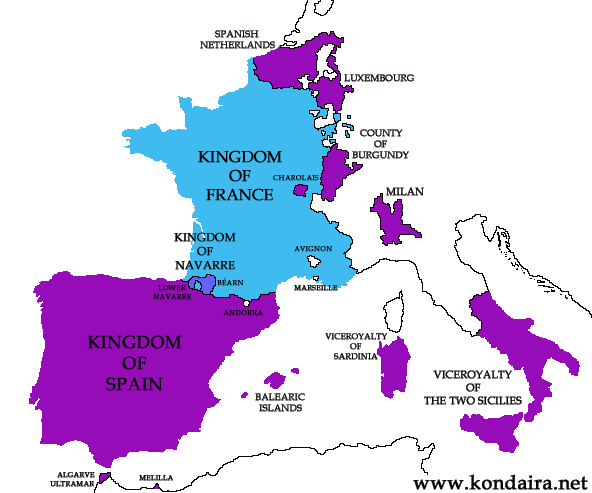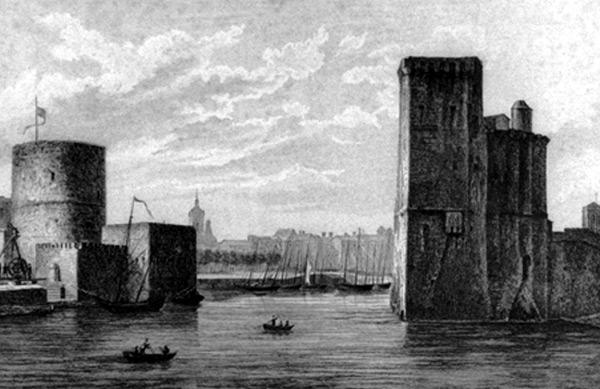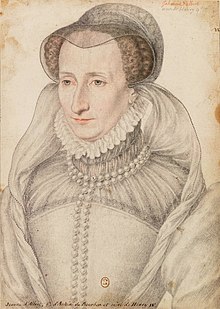Jeanne (sometimes anglicized to Joan) III d' Albret of Navarre was basically a smaller scale, likable, Henry VIII . These two are very similar in that they both brought the Reformation to their country, they were both married more than once, and they both liked making life difficult for the French. The pair were even related by marriage for some eight years. However, unlike Henry, Jeanne wasn't a dick who murdered her friends, spouses, and national economy. Jeanne was a brave and altruistic defender of her faith.
Jeanne was Queen of Navarre, and if you don't know what the hell a Navarre is, don't worry, I didn't know either until I looked it up. I'd assumed it was a region of northern France, much like Brittany, but it turns out Navarre was like a big Andorra. However, unlike Andorra , Navarre was a warring political entity that wasn't content to remain in their valley and go about their business. Navarre was an important part of medieval politics, and it did not take its assimilation into France and Spain quietly.
| A young Jeanne d'Albret |
The only child of an unhappy union, Jeanne was raised away from her parents, and given a somewhat lackluster humanist education. Girls, even royal girls, weren't thought worthy of writing about very much during the Renaissance, so not much is known about Jeanne's early childhood, other than that she was raised by a family friend--Aymee de Lafayette-- and educated by Nicolas Bourbon.*
It isn't until 1540 that Jeanne really shows up in historical record. Like many royal girls of the era, Jeanne's real worth to her family was her marriageability and usefulness as a political pawn. At the ripe old age of 11, Francis I, King of France and Jeanne's uncle, decided that Jeanne should get married to the much older William de la Marck, Duke of Cleves (Anne of Cleves' brother.)
 |
| Map of Navarre (and other places) |
Now, neither Jeanne nor her parents were too thrilled about this match. Her parents were peeved that the King of France had overridden their wishes that Jeanne marry Phillip of Spain, and Jeanne just plain didn't want to marry the man. Jeanne resisted the match and defied the french king, but it was to no avail. in 1547 she was married to William, kicking and screaming. Her dress was so heavy that she could not walk down the aisle, and instead had to be carried. Luckily for Jeanne, after a symbolic consummation of their union she returned to France to live with her family until she reached maturity.
In 1545, after eight years of marriage, Jeanne's marriage to William was annulled. The official reason was that Jeanne hadn't consented willingly to the marriage, and had been forced, but the real reason for the annulment was that an alliance with Cleves was no longer important to Francis. This was fantastic for Jeanne, because in 1548 Jeanne was able to marry Antony de Bourbon**, a man she loved, or at the very least liked.
 |
| Antony de Bourbon |
When Jeanne's father died in 1555 she became the official Queen Regnant of Navarre, though her husband Antony was king in all but name. Despite the initial attraction, the marriage between Jeanne and Antony seemed to have been a rocky one. While they did have three children together, Antony was notoriously unreliable, and could be physically abusive when he didn't get his way.
The next historically important event of Jeanne's life happened in 1560 (or 1562) when she publicly declared herself a Calvinist. She had attended a Calvinist meeting in Paris during the wedding of Mary Stuart and Francis II, and it changed her life. She described the experience in her memoirs as being 'rescued from idolatry' and 'received in His [God's] church'. Jeanne converted, and she convinced her husband as well, because in 1862, Antony also declared himself a Calvinist.
Being a Protestant Monarch during the Reformation was a tricky affair, and Navarre had the bad luck to be sandwiched between two large Catholic powers--Spain and France. The English could get away with doing as they damn well pleased, thanks to their distance from the rest of Europe, and the German states had each other to rely on for defense, but things were tricky for Navarre. It's no surprise then that shortly after his declaration Antony recanted, and proceeded to lead Catholic forces against the Huguenots.
 |
| La Rochelle |
Jeanne was devastated by Antony's defection. In her memoirs she described herself as having 'a thorn put not in [her] foot, but in [her] heart'. She herself, however, never recanted her beliefs, even when Antony threatened her with violence, and France and Spain threatened her with invasion. Jeanne was a stubborn woman, and when Antony died later that year, she set about turning Navarre into a Protestant nation.
On the Reformation scale, Jeanne swung more towards the Puritan end of the scale, and her political reformations proved it. She made laws against gambling, prostitution, blasphemy, and drunkenness, as well as the more tradition laws abolishing Catholic ceremonies, and seizing Church property.*** Her next step was to send funds and military assistance to the embattled Huguenots at La Rochelle.
 |
| Jeanne in her older years. |
Not only did Jeanne send assistance, she went to La Rochelle herself and organized the women there. She assisted in defense strategies and peace negotiations with the French soldiers. It can be said, almost without doubt, that it was her fighting, and her beliefs that led her Calvinist raised son--Henry IV--to issue the Edict of Nantes, which granted Huguenots substantial rights in France, as well as ending the fighting between the two groups.
With much protestation, Jeanne reluctantly agreed to a marriage between her only son, Henry, and the catholic Margaret of France, sister to the French King. It was shortly after her arrival in Paris to attend the wedding that Jeanne died suddenly of tuberculosis, leaving Henry King of Navarre.
*Incidentally, Nicolas Bourbon was also responsible for parts of Anne Boleyn's humanist education.
**Another important fact about Antony de Bourbon, he was in line for the French throne. This enabled his and Jeanne's son Henry to become king of both France and Navarre, uniting the two nations in much the same way James VI/I united England and Scotland
***Unlike Henry VIII, when Jeanne seized the property of the Catholic Church, she didn't use it to enrich herself and her friends. She gave the funds to Calvinist ministry's and to schools. Additionally, when the staunch Catholics of her kingdom rose in rebellion, she suppressed them with force, and then used legal pressures to make them back down. She liberally pardoned rebels, and did not execute vast numbers of rebels like Henry did.
Sources
Jeanne d'Albret--Columbia Electronic Encyclopedia--6th Edition

No comments:
Post a Comment
Thank you so much for commenting! We have turned on comment moderation in order to cut down on the amount of spam and promotional material being sent to us. Provided your comment is not attempting to sell something, your comment will be published within the next 48 hours.